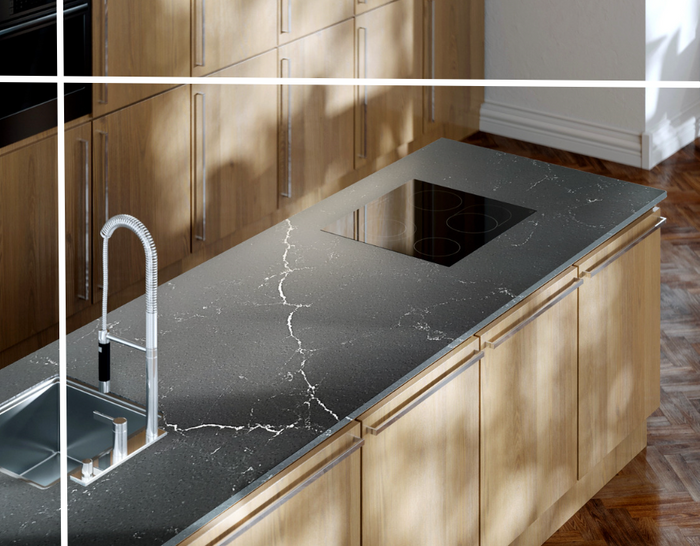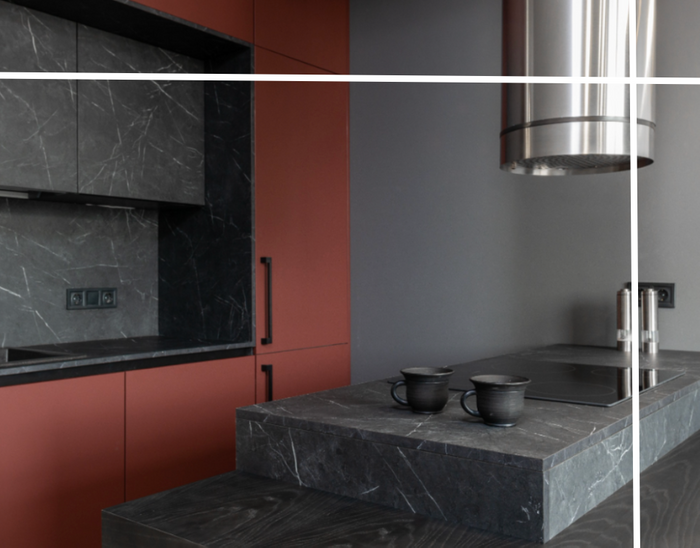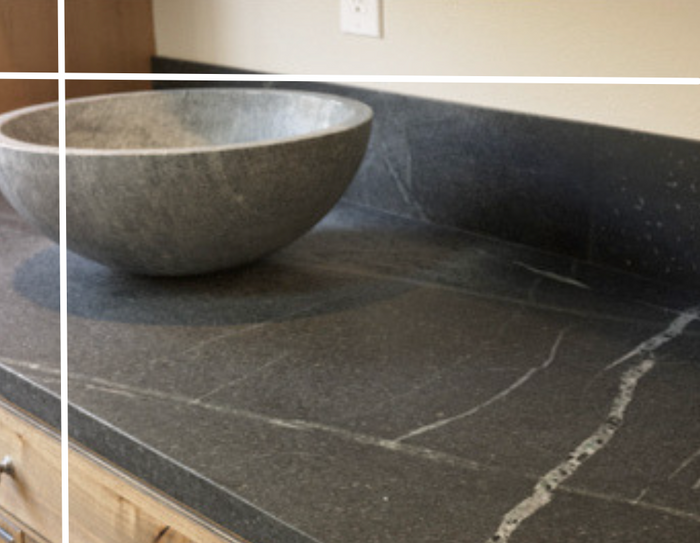Soapstone 101 - An Overview
ALL ABOUT SOAPSTONE
Meet This Versatile Home Finish Option
Ready to Explore Soapstone? Start Here
For a lot of people, soapstone is viewed as a granite alternative, and that’s it. But soapstone is so much more than that!
For instance, did you know that soapstone can be used for more than just countertops? The unique mineral composition that makes soapstone different from marble or granite also gives it a set of features that make soapstone great for a wide variety of different uses.
Read on to explore all the benefits that soapstone has to offer and all the ways this versatile material can be used!


Curious About Soapstone?
Here’s the quick rundown of benefits:
- It’s non-porous
- It’s heat-resistant
- It’s softer than marble (but still a hard stone!)
- It comes in a wide range of colors
- It’s chemically inert (neutral)
- And more…
What actually is soapstone?
Soapstone, scientifically known as steatite, is a type of metamorphic rock, meaning it’s formed from other rocks and minerals that are compressed together through great heat and pressure.
Soapstone is made up predominantly of talc, magnesite, and other minerals — and it’s those “other minerals” that give soapstone such a wide variety of colors as well as its useful characteristics. Talc on its own is a softer mineral. You probably know it, as it’s commonly used in baby powder. Talc is also responsible for the “softer” and almost soapy feeling that gives soapstone its name.

Soapstone and Hardness
Soapstone is often considered a "soft" stone, leading to concerns about durability. However, soapstone is still a stone and is incredibly durable.
Soapstone is categorized based on its intended use and is rated individually on the Mohs Hardness Scale. Soapstone with a higher talc content is less durable and categorized as carving-grade, while soapstone with a lower talc content is categorized as architectural soapstone and is suitable for countertops and other hard-wearing applications.
To ensure the durability of soapstone in your intended use, contact us to discuss your needs and desired application.
The Benefits of Soapstone
Soapstone is Hard, But Also Soft
Soapstone's hardness varies from slab to slab, which provides great flexibility in its use. It is softer than marble or granite, making it easier to work with and more cost-effective.
Unlike granite and marble, soapstone is less brittle and can be cut more easily, allowing for greater flexibility in shape and size. Architectural-grade soapstone strikes the right balance between softness and hardness, making it easier to cut and providing greater flexibility.
Soapstone is Heat-Resistant
This is what makes it a great countertop option specifically; since it’s a heat-resistant material, you don’t need to worry about damaging your countertops if you pull a pan out of the hot oven and put it directly onto your countertop. It’s why stone counters as a whole are so sought after.
Not only is soapstone heat-resistant, but it also absorbs the heat from the source and then emits it into the room slowly over time. Soapstone is often used for masonry fireplaces and fireplace surrounds for this reason. It’s great for colder areas, like Colorado and Minnesota, because you can light a fire, let it burn out naturally, and enjoy the warmth even longer afterward as the soapstone continues to let out heat.
Soapstone is Chemically Inert
This is a quality that really makes soapstone stand out above granite and marble! Being chemically inert means that soapstone is chemically neutral; it is neither acidic nor basic. In essence, it means that soapstone won’t react with substances spilled on it.
This is actually why soapstone is often used for tabletops and countertops in science laboratories. You could slosh bleach or red wine across a soapstone surface and nothing would happen to the stone. In terms of home applications, this means you don’t need any specialty household cleaners to take care of your soapstone. It also means you don’t need to worry about spills damaging the stone, which is why soapstone is used so typically in kitchens and messy spaces like mud rooms.
Soapstone is Non-Porous
This material is naturally non-porous, which means it doesn’t have any of those little nooks and crannies for bacteria and liquids to work their way into.
So not only is soapstone chemically nonreactive, but it’s also naturally stain-proof because it doesn’t have pores. Even more importantly, soapstone is naturally a healthier option because it is non-porous. Without pores, there aren’t spots to harbor viruses and bacteria, which means you can get your counters clean and clear of germs with a few sprays of your preferred household cleaner.
Ways to use Soapstone
Because of its many benefits, soapstone can be used in a surprising number of ways, both with residential and commercial applications.
Some of the most popular options include:
Kitchen and bathroom countertops
Sinks – both farmhouse and more architectural styles
Flooring – soapstone tiles can be great for indoor or outdoor use
Fireplace surrounds and masonry heaters
Backsplashes
Shower/bath tiling
and more…

Finding Soapstone Near You
If you’re ready to tackle those home renovations and upgrade your space with soapstone, we’re here to help.
Connect with the team at Dorado Soapstone for answers to any questions you might have, and find a supplier near you to get started!
